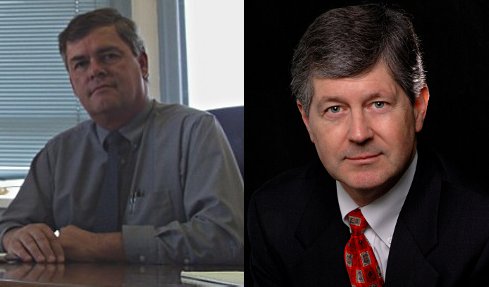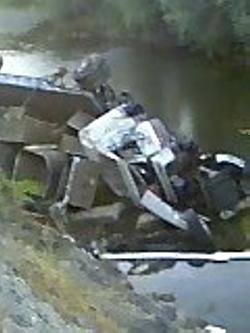
From left, Lakeport attorney Don Anderson says he'll challenge District Attorney Jon Hopkins in the 2010 election. Photo of Anderson by Elizabeth Larson; Hopkins photo courtesy of the Lake County District Attorney's Office.
LAKEPORT – Although the November 2010 election is more than a year away, the race for Lake County's district attorney post already is taking shape.
In an exclusive interview granted to Lake County News, Lakeport attorney Don Anderson this week announced that he'll challenge incumbent District Attorney Jon Hopkins in the 2010 election.
Hopkins, 63, also confirmed to Lake County News this week that he'll seek reelection next year.
“I'm going do it again in 2010,” said Hopkins, who was elected in 2006 after running unopposed.
Anderson, 57, who was a deputy sheriff for 15 years before getting into law 20 years ago, said of his reasons for running, “It's just disheartening to see what Lake County has been through over the last several years, especially recently.”
High profile cases like the trial of Bismarck Dinius have hurt the county's reputation, he said, noting that the Dinius case contributed to his decision to run. In fact, Anderson visited the courtroom many times during the trial to watch how it unfolded.
He added, however, that the problems that he sees in the District Attorney's Office “were there long before the Dinius case.”
Responding to Anderson's challenge, Hopkins said opponents in race bring in better community participation. “And that's always a good thing, I think,” he said.
However, Hopkins – who has 37 years of experience in the criminal justice system – is giving no quarter when it comes to how he runs his agency. While Anderson is criticizing Hopkins for how he handles his department, Hopkins replies with criticism of Anderson that focuses on lack of prosecutorial experience.
Anderson says he sees system from both sides
Anderson said he has support from law enforcement and his law colleagues in choosing to run.
He said his longterm girlfriend Jennifer McGee is all for his decision to seek the district attorney job. “She's been encouraging me to do this for some time,” he said.
Anderson also has the support of his four daughters, two stepsons and 11 grandchildren.
He's not new to campaigns, having run for sheriff in 1994 among a field of five. Anderson came in third in that race, which was won by Rod Mitchell. Next year, Mitchell also is facing a challenge from Francisco Rivero, who has announced his plans to seek the sheriff's post.
Anderson, who has lived in Lakeport since his family moved here when he was a junior in high school, also gained a place in local law enforcement history in 1981 when – following a shootout – he helped capture a couple who shot and killed another deputy sheriff, Richard Helbush.
Annika Ostberg Deasy, who was sentenced to prison in California, was returned to her native Sweden earlier this year, a decision made by federal and state authorities that had concerned both Hopkins and Anderson, as Lake County News reported.
As he's pursued a career in law, Anderson has focused on civil and family litigation as well as criminal defense cases.
One of the strongest attributes in his favor, according to Anderson, is that he's seen the system from both sides – both as a deputy and as an attorney.
As a former deputy, “I know what it's like on the street,” said Anderson.
As an attorney, he's worked on high-profile cases involving police officers, such as former Lakeport Police Officer Richard Erickson, who was acquitted of several charges including allegations that he had misappropriated government funds.
He also represented Shavon Vestal in her suit against the city of Clearlake and the Clearlake Police Department. Vestal's father, David Vestal, was shot to death in June of 2008 during a confrontation with Clearlake Police. Shavon Vestal had sought $32 million; the case recently settled, with the city's insurance carrier paying Vestal $125,200, while her young son received $25,100 and her boyfriend $15,100.
Anderson said he wants to bring back the integrity the office had under former district attorneys Robert Crone and Stephen Hedstrom, both of whom went on to be judges. When Crone and Hedstrom headed the agency, they made their charging decisions based on good reasons, said Anderson.
Currently the District Attorney's Office is charging cases that never should have been charged – and not charging cases that should be prosecuted, said Anderson.
The kinds of problems Anderson cites appeared in the Dinius case, during which the prosecution handing over 119 pages of discovery evidence on the morning the trial started. He said other defense attorneys have shared with him the same problem, which Anderson said illustrates an attitude of wanting to win a case no matter what.
Anderson said he would continue the District Attorney's Office's practice of pursuing grants to support its operations, but he cautions that putting too much emphasis on grants can mean that the money ends up dictating what gets charged.
Addressing questions about his experience, Anderson said he's done many trials and has a good win record.
“It's much harder to defend a case than to prosecute a case,” Anderson said.
In order to build a better relationship with the public, “First you have to change the whole philosophy of the department,” Anderson said.
That would include giving deputy district attorneys more power to resolve cases. Anderson said deputy district attorneys currently have little power to take such actions.
It's important for a district attorney to have confidence in his or her deputies, and Anderson said the District Attorney's Office has a lot of very good young prosecutors.
Hopkins emphasizes decades of experience
Hopkins said he knows the complexities of running a prosecutor's office, and has 24 years of prosecutorial management. His agency this year has a $3.8 million budget.
He said he's also worked as a public defender, and represented thousands of people in that capacity while working in Los Angeles.
“I have a lot of empathy and compassion for the people charged with crimes,” Hopkins said.
An Ohio native, Hopkins is a father of three and grandfather whose early career included seven years as a public defender in Los Angeles County before he moved to Santa Cruz in 1979.
There, he worked as an assistant district attorney and a chief deputy district attorney for seven years before taking the executive director's position with the California District Attorney's Association for a year.
In 1987 he returned to the Santa Cruz County District Attorney's Office as a chief deputy. He was loaned out to the Lake County District Attorney's Office for a homicide case in 1998.
Later – after an unsuccessful application to take on that county's district attorney's job when it was vacated – he and wife, Annette, made the move to Lake County permanently, where he was the No. 2 man in District Attorney Gary Luck's office.
In 2006 he was elected district attorney.
Hopkins has taught for the National College of District Attorneys and the California District Attorneys Association, as well as the Hastings College of Criminal Advocacy.
“I feel like what I'm trying to accomplish here is basically take a farm team from the minors into the majors because of all the young people we've got, because we can't attract experienced people with the low wages that we pay,” he said.
Hopkins said he has a lot of experience with supplemental revenue in the form of grants, and experience with personnel issues in the prosecutor's office.
He also points to “heavy duty, major trial experience.”
An important skill is to be able to teach less-experienced prosecutors so they are ready to take on the cases that are important to the community, said Hopkins.
Lake County doesn't have a lot of violent offenders, but when they do appear, the District Attorney's Office needs to do a good job at prosecuting them, said Hopkins.
Earlier this week Hopkins told Lake County News that he doesn't intend to apply to succeed Judge Arthur Mann, who announced Monday that he's stepping down from his post in Lake County Superior Court's Department 3 effective Nov. 1. Hopkins said that's because he's happiest as a prosecutor.
While Hopkins brings heavyweight credentials and qualifications to his post, he's also prone to the weaknesses that can come with incumbency – including the baggage of unpopular prosecutions.
While he ran unopposed in 2006, the situation for the coming election early on promises to be much different.
Hopkins is at the lowest ebb of his political popularity since arriving in the county, due in no small part to the public outcry over the Dinius case.
He's been roundly criticized both locally and by sailboat enthusiasts around the world for prosecuting Dinius and not Russell Perdock, the off-duty sheriff's chief deputy whose powerboat was traveling at high speed in nighttime conditions when it hit the sailboat Dinius was piloting.
Hopkins said he couldn't convict Perdock based on the evidence available to him, and in an interview last week maintained his belief that the lights on the sailboat Dinius was piloting were off.
Some community members have stated an intention not to wait until next year's election, but to begin a recall petition on Hopkins immediately.
In 2007 he and Sheriff Rod Mitchell both refused to sign on to a countywide ethics policy for department heads, citing First Amendment concerns and the code's prohibition against becoming involved in supervisorial elections, as Lake County News has reported.
Hopkins also was the source of severe criticism for prosecuting San Franciscan Renato Hughes for two counts of homicide in connection with the December 2005 shooting deaths of his two friends, Christian Foster and Rashad Williams.
The three had allegedly broken into the home of Clearlake Park resident Shannon Edmonds, looking for marijuana. During the break-in 17-year-old Dale Lafferty, son of Edmond's then-girlfriend Lori Tyler, was beaten nearly to death and suffered permanent brain damage.
On the stand in the trial – which was moved to Contra Costa County due to pre-trial publicity – Edmonds testified that he shot at Foster and Williams in the back as they ran from his home.
The case came to be cast in racial terms, as Edmonds is white and the other men black. Despite Edmonds' admission to shooting Foster while he was down, Hopkins did not prosecute Edmonds. He did charge Hughes with murder under the provocative act, a law that's not often used but that allows a person involved in a crime that could yield a lethal response to be charged with murder for any deaths that result.
Leaders with the state's chapter of the National Association for the Advancement of Colored People protested the prosecution on the steps of the courthouse in Lakeport.
Hopkins won burglary and assault with a firearm convictions on Hughes, who a jury acquitted of the murder charges.
He maintains that he can't base his department's course on public sentiment.
“There are a lot of aspects to this job that don't strike the eye,” he said. “You have to be able to make judgment calls without bending to outside influences.”
Those influence include local people of standing or – in the age of connectivity – people speaking out on blogs, he explained.
“You need to be able to make decisions without worrying about political implications,” said Hopkins. “That's a very tall order because people want to have things done their way.”
Hopkins added, “The minute you bend to that you've lost your independence, you've lost your objectivity, you've lost your professionalism.”
He said decisions have to be made based on an obligation to the county's residents.
“I'm very proud of the fact that I've actually gone to battle in those types of cases against the odds and sent dangerous people away, protecting the community,” Hopkins said.
What's next for the hopefuls
A 2010 election calendar issued by the Lake County Registrar of Voters Office notes that the petition for signatures in lieu of a filing fee must be filed between Jan. 4 and Feb. 25.
Declaration of candidacy and nomination papers will follow, between Feb. 16 and March 12, with the extension period for nomination papers lasting from March 13 to March 17 – in the case an eligible incumbent doesn't file.
Hopkins said he has many plans ahead as he seeks a second term. He said he has much more to do that requires another term to complete.
“I started out to achieve a lot here,” he said, adding that he wants to take that a lot further.
He said his goal is to build an office that has obvious leadership succession, which includes grooming not just a successor for others who have the training to take on difficult tasks.
“The DA can't do it all,” he said, noting there are many complicated aspects to leadership.
Anderson said his main focus now will be listening to the community.
“I really would like to get input back from the community,” about both problems and solutions, said Anderson.
Anderson can be contacted at his office at This email address is being protected from spambots. You need JavaScript enabled to view it. or 707-263-1775. Hopkins' office can be reached at 707-263-2251 or through the Lake County District Attorney's Web page, www.co.lake.ca.us/Government/Directory/District_Attorney.htm .
E-mail Elizabeth Larson at This email address is being protected from spambots. You need JavaScript enabled to view it. . Follow Lake County News on Twitter at http://twitter.com/LakeCoNews .












